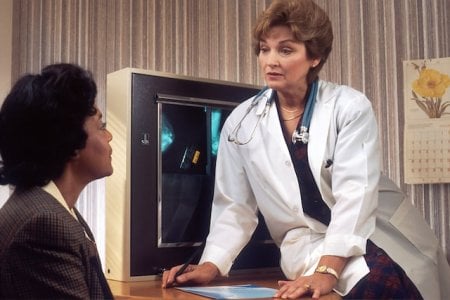Looming GP shortfall ahead as nearly one-third plan to retire in five years, doctors’ group warns
By
Seia Ibanez
- Replies 9
General practitioners (GPs) play a vital role as the backbone of Australia's healthcare system.
However, it’s no secret that the Australian healthcare system is struggling with escalating demand for services.
Amid continuing strain on the system, a recent report revealed dark clouds on the horizon for countless patients across the country.
In a report by the Royal Australian College of General Practitioners (RACGP), it was revealed that almost three in ten general practitioners intend to retire within the next five years.
Intense workloads, burnout, and the complex cases of patients seeing general practitioners were among the top reasons for their decision.

RACGP President Dr Nicole Higgins believes that urgent action needs to be taken to retain this essential healthcare workforce so Australians can still access high-quality healthcare.
'Our report is further evidence that we are facing a looming shortfall of GPs, and we need to do much more to attract and retain this essential workforce, for the health of Australians now and into the future,' Dr Higgins said.
‘Our nation's GPs help people live longer and healthier lives, and reduce pressure on hospitals,’ she added.
Dr Higgins added that several factors discourage medical students from becoming GPs and choosing to specialise in other medical fields.
‘GPs are specialists and do the same eight years of medical training as any other specialist, followed by at least three years further training in a general practice,’ she said.
‘However, GPs are hamstrung at the outset due to discrepancies in conditions and pay between hospitals and private practice.’
GPs are seeing a consistently high amount of people and unprecedentedly spending more time with their patients, according to the RACGP report.
One reason is the complexity of patients' needs and the growing demand for mental health care services.
‘In a typical week, 38 per cent of GP consults involve mental health,’ Dr Higgins said.
Several measures can be implemented to incentivise medical students to specialise as GPs and to maintain the healthcare workforce in the long run.
Dr Higgins said that the most important solution to attract workers and meet Australia’s health needs is by having sustained investment in general practice.
'Addressing these three key barriers would make an immediate difference in getting more GPs training and working in the communities that need them,' she said.
The report also suggested incentive payments for the first six months of community general practice training, study leave, and paid parental leave for training GPs.
Another solution to strengthen the general practice sector is to encourage more GPs to be practice owners.
However, GPs aren't taking that road currently because of the high payroll tax bills associated with the business.
'This needs to be addressed urgently, we need a consistent approach to this tax across Australia and settings for general practice to thrive in every community,' said Dr Higgins.
In a previous story, the RACGP also reported that the number of GPs offering bulk billing to all patients has lowered in the past year. The decline was highlighted by growing healthcare costs, contributing to concerns about patient access and job satisfaction among GPs.
 Do you think consulting with a GP has become more difficult today? Let us know in the comments below.
Do you think consulting with a GP has become more difficult today? Let us know in the comments below.
However, it’s no secret that the Australian healthcare system is struggling with escalating demand for services.
Amid continuing strain on the system, a recent report revealed dark clouds on the horizon for countless patients across the country.
In a report by the Royal Australian College of General Practitioners (RACGP), it was revealed that almost three in ten general practitioners intend to retire within the next five years.
Intense workloads, burnout, and the complex cases of patients seeing general practitioners were among the top reasons for their decision.

A report revealed that almost one-third of GPs intend to retire within the next five years. Credit: Unsplash
RACGP President Dr Nicole Higgins believes that urgent action needs to be taken to retain this essential healthcare workforce so Australians can still access high-quality healthcare.
'Our report is further evidence that we are facing a looming shortfall of GPs, and we need to do much more to attract and retain this essential workforce, for the health of Australians now and into the future,' Dr Higgins said.
‘Our nation's GPs help people live longer and healthier lives, and reduce pressure on hospitals,’ she added.
Dr Higgins added that several factors discourage medical students from becoming GPs and choosing to specialise in other medical fields.
‘GPs are specialists and do the same eight years of medical training as any other specialist, followed by at least three years further training in a general practice,’ she said.
‘However, GPs are hamstrung at the outset due to discrepancies in conditions and pay between hospitals and private practice.’
GPs are seeing a consistently high amount of people and unprecedentedly spending more time with their patients, according to the RACGP report.
One reason is the complexity of patients' needs and the growing demand for mental health care services.
‘In a typical week, 38 per cent of GP consults involve mental health,’ Dr Higgins said.
Several measures can be implemented to incentivise medical students to specialise as GPs and to maintain the healthcare workforce in the long run.
Dr Higgins said that the most important solution to attract workers and meet Australia’s health needs is by having sustained investment in general practice.
'Addressing these three key barriers would make an immediate difference in getting more GPs training and working in the communities that need them,' she said.
The report also suggested incentive payments for the first six months of community general practice training, study leave, and paid parental leave for training GPs.
Another solution to strengthen the general practice sector is to encourage more GPs to be practice owners.
However, GPs aren't taking that road currently because of the high payroll tax bills associated with the business.
'This needs to be addressed urgently, we need a consistent approach to this tax across Australia and settings for general practice to thrive in every community,' said Dr Higgins.
In a previous story, the RACGP also reported that the number of GPs offering bulk billing to all patients has lowered in the past year. The decline was highlighted by growing healthcare costs, contributing to concerns about patient access and job satisfaction among GPs.
Key Takeaways
- A new report from the Royal Australian College of General Practitioners (RACGP) revealed that nearly a third of Australian GPs plan to retire in the next five years.
- Reasons cited for this include intense workloads, burnout, and increasing complexity of patient needs.
- In response to the findings, RACGP President Dr Nicole Higgins emphasises the need for urgent action to increase the Australian GP workforce, including investing in general practice care and introducing incentive payments for newly trained GPs.
- The report also suggested that more GPs should be encouraged to become practice owners, despite many being deterred by high payroll tax bills threatening their business viability.







